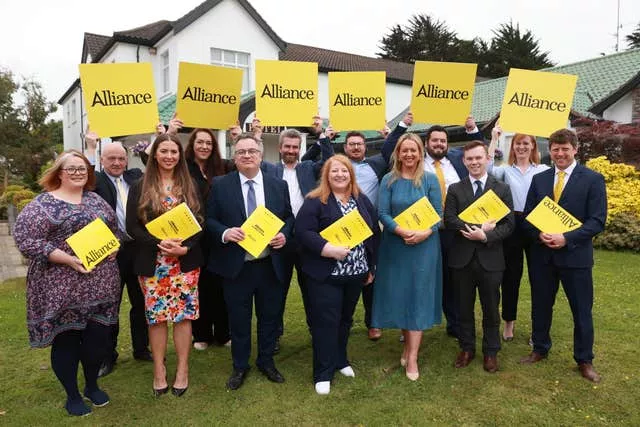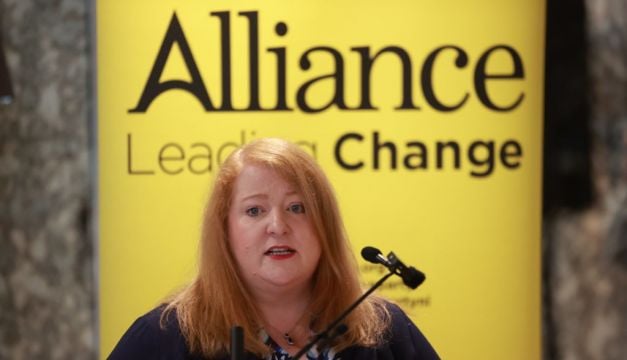The leader of the Alliance Party has warned that her party is no longer going to tolerate Stormont’s “toxic” and “undemocratic” veto system.
Naomi Long used her manifesto launch to challenge the British and Irish governments to show leadership and drive change to the devolved structures in the North.
She said the onus was on the next UK government to act, as she acknowledged that the parties currently holding the veto powers – the DUP and Sinn Féin – were unlikely to give up that leverage.
“The old saying is ‘turkeys don’t vote for Christmas’ … if you can influence that kind of power and control, it’s unlikely you’re going to put your hand up and say ‘yes, let’s give that away, let’s give that leverage away,” Ms Long told party supporters at the launch event on the outskirts of Belfast.
“But it’s incredibly toxic in terms of how we do business, that we still have that imbalance in terms of how we operate together. It doesn’t enhance our ability to co-operate and collaborate and doesn’t encourage people to come together to try and find shared solutions. It simply allows people to throw up roadblocks and I think it needs to change.”
Ms Long’s cross-community party has long campaigned for reform to remove the veto power to collapse the institutions held by the biggest unionist and nationalist parties.
Since 2017, both Sinn Féin and the DUP have pulled the plug on powersharing, meaning Northern Ireland has been without a devolved government for five of the last seven years.

Buoyed by a series of election successes in recent years, Alliance has established itself as the third-largest party in the North – a rise reflective of the growing middle ground in the region that does not vote on traditional orange and green lines.
It goes into the election defending one seat – North Down – but is hopeful of making gains, with East Belfast and Lagan Valley key targets.
Ms Long, who is running against DUP leader Gavin Robinson in East Belfast, said institutional reform was needed to end the “cycle of crisis and collapse”.
She said the case for structural change was overwhelming.
“I don’t think we need to win the intellectual arguments anymore, what we’re looking for is some courage in terms of the parties in Dublin and London to show leadership to make this change happen, so people in Northern Ireland can have confidence in their political institutions and know that when they vote for somebody, there’ll be a government for them to go into,” she said.

Alliance’s Leading Change manifesto also prioritises securing a new financial deal for Northern Ireland, with an improved funding model for the allocation of resources to the region.
The party is also seeking a review of existing and potential revenue-raising levers for Stormont and consideration of the devolution of more tax-varying powers to the devolved administration.
The manifesto also calls for reform of government spending rules to free up funding to tackle climate change, a move the party says could facilitate a green new deal for the North.
Alliance also wants the British government to commit more funding to integrated education in the region.
Under the terms of the Good Friday Agreement of 1998, Stormont has a governance system that incorporates mutual veto powers, enabling blocs of unionist and nationalist MLAs to stop moves that otherwise command majority support and, in extreme circumstances, pull down the institutions and prevent them operating.
The mechanisms were introduced during the peace process as a way of protecting minorities in Northern Ireland’s divided society.
But Alliance insists the structures no longer reflect modern-day Northern Ireland and wants changes to voting systems within both the Assembly chamber and at the Executive table to ensure votes cast by MLAs who consider themselves neither unionist nor nationalist are given the same weight as others.
Last year, Ms Long, who serves as Justice Minister at Stormont, warned she was prepared to test the legality of the existing devolved structures.
“We’re conscious of the cost of vetoes in government – of projects blocked and delayed because agreement can’t be found,” she told the manifesto launch in Carryduff.
“Those vetoes have held us back when there is a government – wasted time, wasted resources, wasted money.
“But, worse than that, they have denied us government too often. And that is not sustainable. It’s not acceptable. It’s not democratic. And we are not going to tolerate it any longer. We will work for reform of the Stormont institutions to ensure that no single party can ever again collapse the Executive and Assembly, that all votes in that chamber count equally and that the abuse of vetoes is ended.”
Asked about the prospect of a Labour government in London, Ms Long said her job was to convince the party of the need to act.

“My strongest argument to that is that if they don’t make the change while things are stable and while there’s a window of opportunity, they are storing up crises down the line,” she said.
“We know that has been the pattern of the Assembly, not just in the last few years, but over the last 25 years – we need to end that cycle of crisis and collapse.
“I don’t want to see the UK government and the Irish Government flying into Stormont to try and cajole us all to go back and do the jobs that we said we wanted to do (after another collapse).
“I want them to work with us now, while we’re in government, to ensure that the instabilities are addressed. We have proposals to do that. If other parties have better proposals, let’s see them. Let’s have the discussion. But we have opened this debate.”







